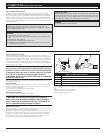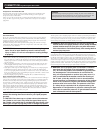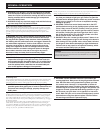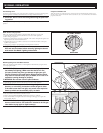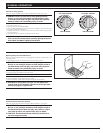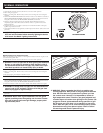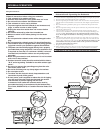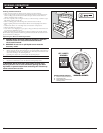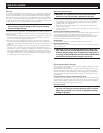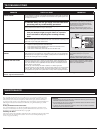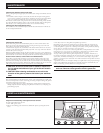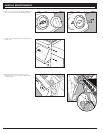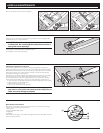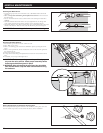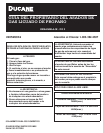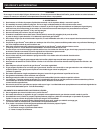Special offers from our partners!

Find Replacement BBQ Parts for 20,308 Models. Repair your BBQ today.

17
HELPFUL HINTS
Flare Ups
Any time you cook fatty foods over an open flame, you can expect flare ups. Flare ups
are caused by the flash which occurs when the natural juices fall on the heat distribu-
tion plates. Controlled flare ups give foods their delicious outdoor flavor and appear-
ance. Excessive flare ups may occur when your grill is not level or when cooking fatty
foods such as spare ribs and chicken parts, especially if the cooking temperature is set
too high. These flare ups should be controlled or your food will burn, although it will
not burn nearly as much as you might think even in the direct flame.
WARNING: Do not spray or pour any liquid into the cooking
box to control flare ups. Doing so will void your warranty
and may damage the grill.
To help control flare ups, we suggest using leaner cuts of meats and trimming excess
fat from the meats to be grilled. Also, your grill should be level. If flare ups do occur,
use the “Low” control setting and relocate the meat on the cooking grid until the flare
ups have subsided.
1. To prevent food from sticking to the grid, preheat the cooking surface with the hood
down for 10 minutes. Place the meat product on the grid and allow it to remain
there for at least half of the suggested grilling time.
2. It is unnecessary to keep flipping meat products— allow them to sear and seal in
their juices, then halfway through the cooking period, with a spatula, flip the meat
product onto its other side. When grilling chicken, always place the meat side on the
grill first.
3. A light coating of oil applied to any of the meat products prior to grilling will also
help. The use of a commercial spray cooking product is also helpful. This spray
should only be used prior to lighting your grill but never during the cooking period.
Use of spray cooking product can leave a black stain on areas of your cook grate.
This is not harmful and does not affect cooking; however, if this becomes an appear-
ance problem, the best way to remove the discoloration is by placing the cook grate
in a self-cleaning oven during the clean cycle.
When Using the Rotisserie
WARNING: The rotisserie motor must be stored indoors
when not in use. Do not leave it mounted on the grill.
1. When using the rotisserie, the hood must be closed except when basting.
2. Important: Always light rotisserie burner with the hood in the full open position.
3. It is important to evenly balance the meat on the spit rod. This can be difficult
especially with a turkey. Proper balancing will lead to more even cooking and
prolong the life of the rotis motor.
4. Pliers may be used to tighten thumb screws on meat forks when larger cuts of
meat are being rotissed.
5. Use twine to secure the meat on the spit rod, especially fowl or other cuts of meat
that require tying.
Rotisserie Bracket (Motor Bracket Side)
When mounting the spit rod motor onto the motor bracket (right side burner box), the
ears of the motor bracket must be fully inserted into the spit motor slots.
Accomplish this by sliding the spit motor down to the stops of the spit motor bracket.
The spit rod should not be making surface contact with the slot in the spit motor
bracket. See Assembly Guide for more information.
Shelf/Shelves
Do not use shelf or shelves as a cutting board. Clean with soap and water.
Moving Portable Grills
When your grill is not in use and you wish to relocate it, we recommend you push the
grill by the side shelf.
CAUTION: If your grill is portable and you are using a gas
tank, make sure you turn the appliance control knobs first,
and then the gas supply tank. On permanent installations, it
is strongly recommended that the inline field installed cutoff
valve also be turned off when the grill is not in use.
Storing Liquid Propane Gas Grills
After you have finished cooking and have cleaned your grill (see Maintenance section
for cleaning) turn your grill off!
When the grill is to be stored indoors, the connection between the propane gas sup-
ply tank and the grill must be disconnected, and the tank removed from the grill
and stored outdoors in a well-ventilated space. When the propane gas supply tank is
not removed from the grill, the grill and the tank must be stored outdoors in a well
ventilated space.
Gauging Amount of Fuel in Liquid Propane Tank
To gauge the amount of propane fuel in your gas tank, (propane tank without gauge)
the grill must be in operation. Place your hand at the top of the tank and slowly move
it down the side until the tank feels cool to the touch of your hand. This will indicate
the approximate amount of propane gas in your tank.
Gas Valve Orifice
WARNING: Any alteration made to the orifice(s) such as drill-
ing it out, will void your warranty and may result in serious
bodily injury or death, or in a fire or an explosion causing
damage to property.



